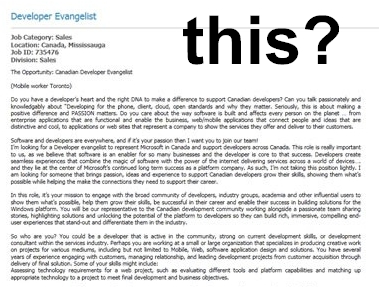This week three men shared the 2010 Nobel Prize in Economic Science. Here’s the problem they’ve been working on for decades:
The researchers spent decades trying to understand why it takes so long for people to find jobs, even in good economic times, and why so many people can be unemployed even when many jobs are available. (Economists Share Nobel for Studying Job Market, NY Times)
 These researchers took the classic, academic “long away around” and still haven’t figured out what simple common sense tells us.
These researchers took the classic, academic “long away around” and still haven’t figured out what simple common sense tells us.
People don’t find jobs. They don’t search for jobs. They post some information about themselves online and then wait like doofusses for jobs to come along.
Employers don’t search for new employees. They post job descriptions (a decade ago they ran classified ads) and teams of HR “recruiters” sit on their duffs in front of computer displays waiting for who comes along.
“Who comes along” usually isn’t worth hiring. So, what are these researchers really studying?
They’re studying the artifacts of Duh-oyyyy! They’re not studying the behavior of markets or the behavior of job hunters and employers. They are distracted and mesmerized by the artifacts of the mechanical process of sorting data.
The failure of job hunters and employers to come together “even when many jobs are available” has nothing to do with economics.
It has to do with the mindless process that promotes random job hunting and random hiring. Where in the Nobel Laureates’ reports is a description or analysis of the machine that grinds up job hunters and employers alike, without spitting out “matches?” Where is their prescription for beating the system to get the job done?
Life is short, for people and for companies. The prescription is simple. Go find the people you really want, and go find the companies you really want to work for. Don’t take what comes along.
These researchers’ explanation addresses the complications that come from searching for jobs and job candidates: it takes time for unemployed workers to be matched with the proper opening, since people are not identical, cookie-cutter units, and neither are jobs.
It takes time? Time is wasted because no one acknowledges that the Employment System we rely on has no clothes. I love the total failure to attribute any responsibility to anyone or anything: “it takes time for unemployed workers to be matched…” Duh-oyyyy! Why is that? Why does it take time and who or what is responsible?
How do you get a Nobel when you fail to answer that basic question?
Gee-whiz. “Neither people nor jobs are cookie cutter units?” Gimme a friggin break. The Employment System treats both exactly as cookie cutter units: records in databases, sequences of keywords, lists of skills, bits of data waiting to be matched at the level of letter combinations.
The scientists working on this problem need to pull out Occam’s Razor and start cutting through the bullshit. They problem they describe is not an economic phenomenon. It’s an artifact of the systemic robbing of employers and job hunters. Employers are systematically deprived of their workers, and job hunters of jobs, while everyone is off blindly roaming the jobs and resume databases.
This is not Nobel science. If you want a job, figure out who does the work you want to do and go hang out with those people. They will quickly help you determine what additional training you need, introduce you to the right people, guide and advise you toward a job.
If you want to find a good worker for your business, go hang out with people who do the work you need to have done. Learn from them who can do the work, ask for recommendations, and then go to the person you want and talk shop with them.
Stop washing your hands with gloves on. Get out of the databases and go talk to the actual people and companies.
The idea that Nobel laureate economists are missing the simple explanation suggests no Prize is warranted. The researchers are blinded by the process business uses to find new hires. Yet they don’t say one word about the fact that today, in the midst of what is arguably the biggest glut of unemployed, talented workers we have ever seen, employers and job hunters alike rely almost exclusively on a system that does not work. The Nobels aren’t seeing or reporting that the emperor has no clothes.
I mean, what are Nobel scientists for, if not to point out The Naked Embarrassment?
This is not an economic phenomenon. It’s a simple racket. Employers are being scammed by the behavior of an HR profession that is content to “interview who comes along,” and by the likes of CareerBuilder, Monster.com and an Employment Industry which is glad to deliver “what comes along.”
The researchers spent decades trying to understand why it takes so long for people to find jobs…
Duh-oyyyy!
.

 This is another example of how the HR function is increasingly devoted to dumbing down the organization. To HR, salary increases are routine, based on longevity. You might as well be working for the government.
This is another example of how the HR function is increasingly devoted to dumbing down the organization. To HR, salary increases are routine, based on longevity. You might as well be working for the government. ted… Joey deVilla over at Microsoft Canada has a good idea.
ted… Joey deVilla over at Microsoft Canada has a good idea. And that’s the point. deVilla is telling you up front what this gig is really like. Yah, he makes it look great — there’s definitely some selling going on here. But lordy, there’s no selling at all going on in that other document. If deVilla’s posting makes it look like working with his team is a party, that HR word pile up above makes it look like life in a straitjacket!
And that’s the point. deVilla is telling you up front what this gig is really like. Yah, he makes it look great — there’s definitely some selling going on here. But lordy, there’s no selling at all going on in that other document. If deVilla’s posting makes it look like working with his team is a party, that HR word pile up above makes it look like life in a straitjacket! These researchers took the classic, academic “long away around” and still haven’t figured out what simple common sense tells us.
These researchers took the classic, academic “long away around” and still haven’t figured out what simple common sense tells us. the employer expects it. I once landed a job I really wanted by using a
the employer expects it. I once landed a job I really wanted by using a